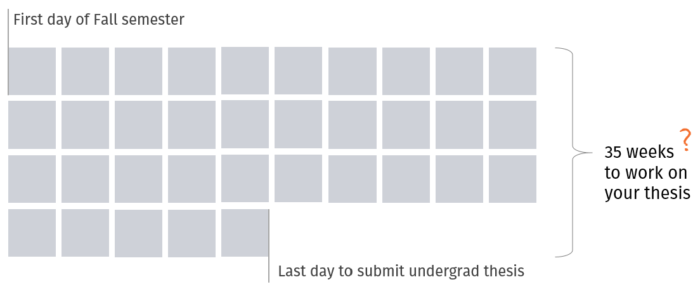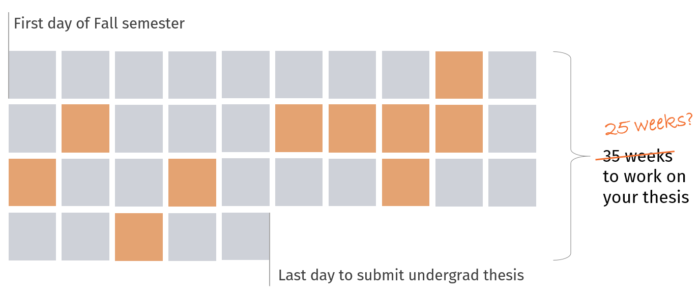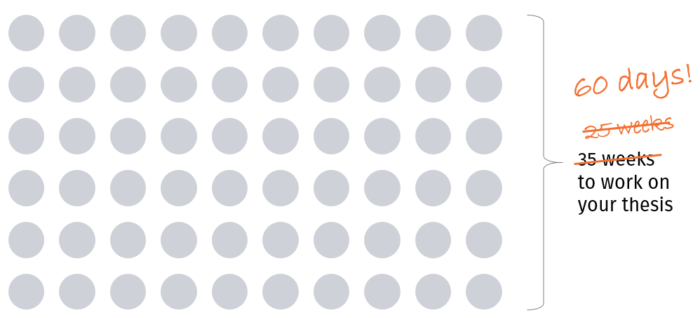
So you have an undergraduate thesis to write? No stress, the semester hasn’t even started yet. When it does, you have an entire academic year to write it. And most of the work will be done Spring semester, so there’s no need to worry about it now! Oh, if only… As someone who recently went through this, I’m sad to report that you’ll probably have less time than you think, but I’m also happy to share that there are ways to successfully weather the undergrad thesis.
First, let’s break down senior year so we can see how much time you really have for your undergraduate thesis.
Between two semesters and IAP, you have about 35 weeks to complete your thesis. Piece of cake, right? 
Well, you have other classes and commitments during each semester. Are you traveling for IAP? Are you working over Spring Break? How much time will you spend on your thesis during project and finals weeks? Optimistically, you are looking at 25 weeks of actual thesis work.

That’s a bit less than 35, but still plenty of time! Well, you are not going to spend every day of those 25 weeks on your thesis. A new pset is due every week. If you are taking the senior capstone, there will be plenty of work on your plate each week in the Fall. Do you plan on working every Saturday?

Realistically, that leaves you 2-3 days in a good week to work on your thesis. That is roughly 60 days from the first day of thesis tutorial (22.ThT) to submitting your final thesis draft (end of 22.ThU). With time being a very limited resource, you’re going to need an airtight plan.

But don’t fret! With a forward-thinking attitude, your undergrad thesis can be one of the most fulfilling experiences to end your undergraduate career at MIT. There are plenty of resources in the department, and with a few pointers from a veteran of the experience (in this case, me), we can remove some stressful days and hair-pulling nights from your thesis odyssey.
Tip 1: Start Early
Your goal should be to hit the ground running on the first day of Spring semester collecting useful data. The work of the Fall semester, then, should cover all the preparatory work. Why? Because even though most of the early work on your thesis does not require a ton of effort, it will take a considerable amount of time. Finding a thesis topic, for instance, involves emailing professors who are not on your timetable, so sending an email in August is a solid way to have a project by September. Also, what will you need for your research? Do you have a license for any software you will use? Will you need experimental materials that may take weeks to order and ship? This is work that will take minutes on your end, but may take months to hear back from. Start ASAP.
See what else you can do now to make things go more smoothly later. Once you have all the equipment for your project, do you know how to use it? Will the method you proposed bring the results you anticipate? Even a single afternoon in lab familiarizing yourself with your experimental setup and dry-running your methodology can be crucial to collecting sufficient data in a reasonable timeframe in the Spring, and more importantly to identify issues while you have time to address them.
Tip 2: Make Yourself Accountable
So, you have properly organized your time; you ironed out your experimental setup and you know how to use the proprietary software for your project. It’s the first day of Spring semester and you are ready to make quick, easy work of your thesis. But you already have a reading due tomorrow and a pset due next week. The week after, you have a paper draft and a project proposal. The semester has only begun and already it feels like each and every week is packed with no room for your thesis work.
With a looming deadline months away and many more pressing requirements every week between, it can be difficult to focus time and energy regularly on your thesis. A simple, albeit hard-to-swallow, remedy is to make yourself as regularly accountable to your thesis as your other commitments. One way is to pick a day each week that you will only work on your thesis (how about “Thesis Thursday”?). Or the solution that worked for a career procrastinator like myself is to arrange weekly meetings with your thesis advisor. Nothing gets you more productive than having to present an update each and every week!
The goal is to work on your thesis in a regular weekly cadence as opposed to a couple disjointed sprints every few weeks. With a system of accountability in place, you will not only be kinder to yourself in dividing your thesis work into more digestible tasks, but also improve the quality of your work by identifying errors earlier and coordinating next steps with your advisor more frequently.
Tip 3: Write Everything Down
With proper preparation and a system for smoothly and regularly accomplishing work on your thesis, you may feel you have gotten this beast of a thesis tamed. That is, until the second week of April when you will hear the words you have been dreading all semester: the thesis draft. After all, the goal of the undergrad thesis is not just to perform original research but to produce a bona fide technical paper. And that task to turn months of research into a hefty report in a couple weeks can appear insurmountable. The simple but unappetizing alternative to the herculean effort of cranking out your entire thesis in ten days is, unsurprisingly, to start writing sooner.
Preliminary writing work does not need to be formal, publication-ready prose. Instead, focus on useful snippets that will ultimately find their way into your final draft. Did you have a conversation with your advisor on how to set up a model? Write it down. Did you need to change the experimental set up because the standard method of measurement will not work in your circumstances? Write it down. Did your advisor remark on the significance of a particular data point during a meeting? It may come as a surprise, but you should probably write that down too. What at the time may appear as logical and straightforward steps in your research can become unclear when you begin drafting months later. The failproof method for not forgetting a single detail of your work is to take extensive notes throughout the process. You will not only have these details readily available, but these notes can serve as jumping-off points for more nuanced discussion in your thesis.
That’s all it takes to turn your thesis into a cake walk! It can seem like a lurking Lovecraftian horror sent to wreak havoc on your senior year. And without a game plan, your thesis can indeed cause monstrous pains during your final weeks at MIT. But with a little planning and a dash of foresight, your thesis can be a rewarding endnote to your undergraduate career. And you can fit it all on a Live, Laugh, Love sign. Print it out, hang it up next to your desk. These are words to live by.

Liam Hines received his undergraduate degree from MIT NSE, and is now a graduate student in Prof. Koroush Shirvan’s group. He is also an NSE Communication Fellow.
Published August 31, 2022
Related articles and resources:
As always, be sure to use the Comm Lab! You can make an appointment with us to receive field-specific feedback, or you can schedule multiple sessions at regular intervals to keep up with your writing milestones (22.ThU students do this all the time!).
